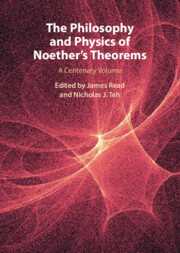Book contents
- Frontmatter
- Contents
- Contributors
- Introduction
- 1 The Noether Theorems in Context
- 2 Felix Klein and Emmy Noether on Invariant Theory and Variational Principles
- 3 Moscow, Oxford, or Princeton: Emmy Noether’s Move from Göttingen (1933)
- 4 Getting to the Bottom of Noether’s Theorem
- 5 BV Quantisation in Perturbative Algebraic QFT: Fundamental Concepts and Perspectives
- 6 Divergence Invariant Variational Problems
- 7 Do Symmetries ‘Explain’ Conservation Laws? The Modern Converse Noether Theorem vs Pragmatism
- 8 Noether’s First Theorem and the Energy-Momentum Tensor Ambiguity Problem
- 9 Noether’s Theorems and Energy in General Relativity
- 10 Geometric Objects and Perspectivalism
- 11 Substantive General Covariance and the Einstein–Klein Dispute: A Noetherian Approach
- 12 Noether Charges, Gauge-Invariance, and Non-Separability
- 13 Observability, Redundancy, and Modality for Dynamical Symmetry Transformations
- 14 The Gauge Argument: A Noether Reason
- Index
6 - Divergence Invariant Variational Problems
Published online by Cambridge University Press: 22 September 2022
- Frontmatter
- Contents
- Contributors
- Introduction
- 1 The Noether Theorems in Context
- 2 Felix Klein and Emmy Noether on Invariant Theory and Variational Principles
- 3 Moscow, Oxford, or Princeton: Emmy Noether’s Move from Göttingen (1933)
- 4 Getting to the Bottom of Noether’s Theorem
- 5 BV Quantisation in Perturbative Algebraic QFT: Fundamental Concepts and Perspectives
- 6 Divergence Invariant Variational Problems
- 7 Do Symmetries ‘Explain’ Conservation Laws? The Modern Converse Noether Theorem vs Pragmatism
- 8 Noether’s First Theorem and the Energy-Momentum Tensor Ambiguity Problem
- 9 Noether’s Theorems and Energy in General Relativity
- 10 Geometric Objects and Perspectivalism
- 11 Substantive General Covariance and the Einstein–Klein Dispute: A Noetherian Approach
- 12 Noether Charges, Gauge-Invariance, and Non-Separability
- 13 Observability, Redundancy, and Modality for Dynamical Symmetry Transformations
- 14 The Gauge Argument: A Noether Reason
- Index
Summary
Given a Lie group acting on the space of independent (spacetime) and dependent (field) variables, it is proved that a divergence invariant variational problem is equivalent to a strictly invariant variational problem if and only if a certain associated cohomology class in the invariant variational bicomplex vanishes. This result is illustrated by several examples, starting with the free particle Lagrangian that appeared in Emmy Noether’s original paper, and includes derivations of associated conservation laws through application of her First Theorem. The chapter concludes with some speculations as to the role such cohomology classes might play in fundamental physics, based on the construction of suitable invariant Lagrangians.
Information
- Type
- Chapter
- Information
- The Philosophy and Physics of Noether's TheoremsA Centenary Volume, pp. 134 - 143Publisher: Cambridge University PressPrint publication year: 2022
